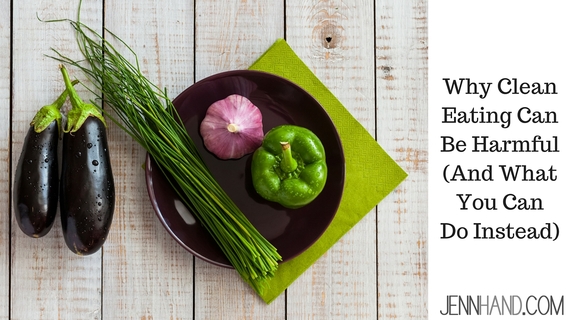Clean eating is all the rage these days. Wherever you look, there's someone raving about the benefits of their 30-day eating clean challenge, showcasing amazing before and after pictures, and swearing to eat this way forever.
Which is great if it works for the person doing it.
But there's a huge part of the population that battles dieting, food and weight. (*raising my hand because I've binged and restricted for over 12 years of my life...)
So for them (and me), clean eating can be a slippery slope down into the abyss of rigid, restrictive, dieting habits and back into food obsession.
The problem with clean eating is that it implies all foods are either "clean" or "dirty." If you're not eating fruits, vegetables and lean proteins, then the foods you're ingesting are "dirty."
But what is a dirty food? Is it unclean to eat? Does it imply were damaging to our health? Is having sugar and bread every once in a while going to create toxicity in our bodies?
The clean eating trend, that's meant to be healthy and helpful, is creating a generation of eaters that stray farther from listening to their bodies and deeper into obsessing over every morsel that goes into their mouths.
And for anyone that's struggled with dieting or weight for a lifetime, this can be dangerous.
We don't want to live beating ourselves up for not adhering to another way of eating. We want to strive for a holistic, inclusive, healthy relationship with ourselves, instead of swearing to eat clean and masking it as another diet.
So the next time you're tempted to eat clean for 30 days, here's what to focus on instead:
1. Have "sometimes" foods.
Instead of mandating that everything not "clean" be off-limits, have sometimes foods. Yes, cakes, cookies and candies aren't everyday foods. But they can be eaten sometimes.
When you make foods forbidden, it can create the opposite outcome that you intend. You may end up wanting everything that you've deemed off-limits, because, well, you're human! You crave things every now and then. And once something is forbidden, it makes it that much more tempting.
A better way to look at it is having "sometimes" foods. Are brownies healthy? Not really. But eat them every once in a while and you'll be okay. Should you eat chocolate chip pancakes drizzled with syrup for breakfast every morning? Probably not, but every once in a while it can't hurt.
2. Focus on nourishment.
Yes, a fresh salad with Farmer's Market greens, organic grilled chicken and sautéed asparagus might be super healthy, but what if you just want a big ole helping of your mom's homemade mac and cheese?
Remember that nourishment is not just physical. Our bodies are not machines where it's just calories in, calories out. Nourishment is multi-faceted and includes the mental and emotional part of yourself, as well.
If the homemade mac and cheese deeply comforts you because it reminds you of home, the love and laughter in your family, and all those birthdays' where your mom made you mac and cheese, by all means eat it and enjoy every morsel. It's important to understand that nourishment includes the physical, mental AND emotional part of you... so eat to satisfy all of those.
Sometimes, nourishment calls for comfort foods and other times it calls for lighter fare. Be mindful of what your body actually wants and allow yourself to be deeply nourished.
3. Don't let society's fads influence you.
The diet and weight loss industries go through cycles. Remember when Atkins was all the rage? And people swore off any type of carb because it was "bad"? A few years after that trend, studies then came out that claimed we needed carbs. And so people started eating carbs again.
Be careful what information you listen to. Just because clean eating is all the rage now, doesn't mean in five years a new study could come out that says too much kale is actually bad for you.
Remember that you are your own greatest asset. We are all born with innate body wisdom. Keep learning how to get back in touch with your own intuition and you'll be able to tune out the voices of society that tell you what to eat.
Yes, it's important to fuel your body in a healthy way, but that can look very different depending on your own body's needs.
If you are tired of starting over every Monday, grab your FREE "Must Have Guide To End The Diet Cycle Today." To stop obsessing over food and your body 24/7, c'mon over and visit www.jennhand.com.
---
If you're struggling with an eating disorder, call the National Eating Disorder Association hotline at 1-800-931-2237.
